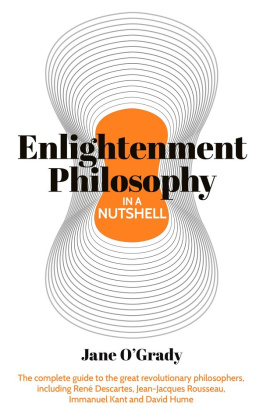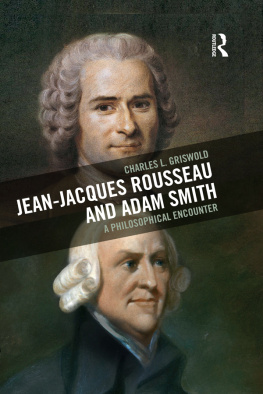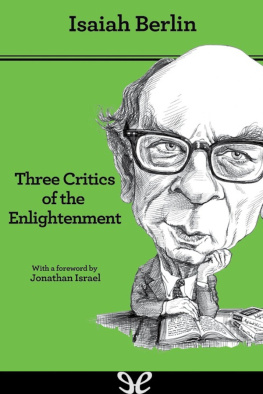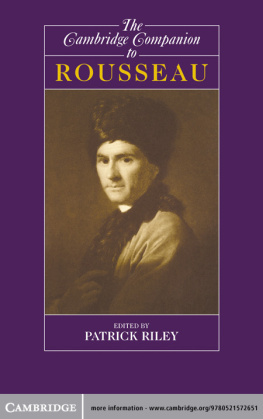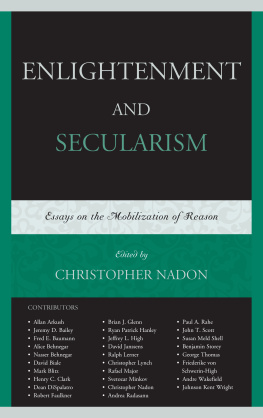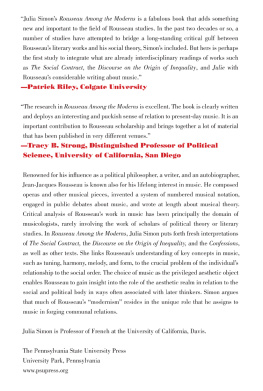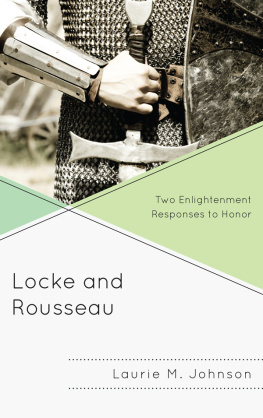Rousseau, the Age of
Enlightenment, and Their Legacies

Rousseau, the Age of
Enlightenment, and Their Legacies

Robert Wokler
Edited by Bryan Garsten, and with an introduction by Christopher Brooke

Copyright 2012 by Princeton University Press
Published by Princeton University Press, 41 William Street, Princeton, New Jersey 08540
In the United Kingdom: Princeton University Press, 6 Oxford Street, Woodstock,
Oxfordshire OX20 1TW
press.princeton.edu
All Rights Reserved
Cover art: Anicet-Charles Lemonnier (17431824), The First Reading at Mme Geoffrins of Voltaires Tragedy LOrphelin de la Chine, 1755 (oil on canvas) / Acadmie des Sciences et Belles Lettres, Rouen, France / Giraudon / The Bridgeman Art Library International
Library of Congress Cataloging-in-Publication Data
Wokler, Robert, 19422006.
Rousseau, the Age of Enlightenment, and their legacies / Robert Wokler ; edited by
Bryan Garsten; and with an introduction by Christopher Brooke.
p. cm.
Includes bibliographical references (p. ) and index.
ISBN 978-0-691-14788-8 (hardcover : alk. paper) ISBN 978-0-691-14789-5
(pbk. : alk. paper) 1. Rousseau, Jean-Jacques, 17121778. 2. Enlightenment.
I. Garsten, Bryan. II. Title.
B2137.W65 2012
194dc23 2011034661
British Library Cataloging-in-Publication Data is available
This book has been composed in Sabon
Printed on acid-free paper.
Printed in the United States of America
1 3 5 7 9 10 8 6 4 2
CONTENTS

: Bryan Garsten
: Christopher Brooke
FOREWORD

Robert Wokler was renowned for his brilliant oral performances at academic colloquia and for the elegant essays that often resulted when he set those performances, and the research behind them, down in prose. Too much of that prose has been difficult to finddispersed in a whole variety of publications, many of which remain difficult to access even with modern technology. Near the end of his life, once it became clear that he would not have a chance to finish writing the books he had planned, Wokler conceived the idea of putting a number of his articles and essays together into one volume, so that they might together make their cumulative argument defending the Enlightenment and Rousseaus rightful place in it. He asked me to ensure that the project came to fruition.
In preparing these articles for re-publication, I have changed hardly anything in the prosea few small revisions have been made, often on the basis of Woklers own handwritten corrections to the published versions. The citations, however, have been edited a bit more assertively. Since the chapters were originally published in different venues and over a long period of time, the citation formats varied widely; in this volume they have been standardized. Since Wokler sometimes cited French editions of Rousseaus works that are now difficult to find, references to the standard Pliade edition of Rousseaus Oeuvres compltes have been added. In addition, since not all readers can be presumed to have Woklers fluency in various languages, citations of Rousseaus works in French have been supplemented with references to the corresponding pages of accessible English translations, using, whenever possible, editions that Wokler himself endorsed. And where Wokler quoted passages in the original French, German or Latin, this volume has added English translations, usually in the notes. These translations are drawn from existing English editions when possible, but if no source is given the translation is new. There were, in addition, several mistakes in the original citations that have been corrected in this re-publication. Editorial additions and translations appear in square brackets while minor corrections have simply been incorporated into the text.
The volume that you are holding represents our best effort to produce the book that Wokler envisioned. I say our best effort because this project was very much a collaborative one. Ian Malcolm at Princeton University Press was quick to see the worth of the proposal and guided the projects first stages with his well-known insight and efficiency. Kimberly Williams at the Press put in many hours getting the essays into shape for re-publication, and Dale Cotton, Hannah Paul, Al Bertrand and Lauren Lepow all provided wonderful assistance in bringing the project to completion. Tom Broughton-Willett skillfully prepared the index. Jeremy Jennings offered detailed reflections on the whole manuscript and helped to determine its final shape. Henry Hardy offered valuable advice drawn from his experience in publishing Isaiah Berlins essays. Ryan Hanley and Jennifer Pitts, two historians of political thought whom Robert generously befriended and mentored at Yale, helped with the selection of articles and gave feedback on the Introduction. Stefan Eich, a Ph.D. student at Yale, found citations to English versions of passages that Wokler had cited, provided new translations of German quotations, and proofread the entire manuscript with great care. Christopher Brooke played a key role throughout, offering insightful advice on the structure of the volume, helping with editorial matters and translations, and, of course, writing the Introduction. Finally and crucially, Roberts sister Ann Wochiler was really nothing less than an editor herself; she put in countless hours of painstaking work on the manuscript and brought considerable insight into her brothers work to bear at every stage of the project. She also granted me access to her brothers papers, drafts and correspondence. The cooperation that propelled this volume forward is a testament to the generous scholar who inspired it and a sign of how important all of us think it is that his best thoughts reach the wide audience they deserve.
The essays in this volume are graceful, sinuous and rich, and so cannot easily be summarized. When taken all together, however, they make a coherent and forceful argument, one that Wokler may have articulated most sharply in his remarks on Alasdair MacIntyres writings (reproduced here as ), where he wrote a sentence that might serve not only as a thesis statement for this volume, but also as a synopsis of his deepest conviction as a scholar: The moral chaos of the modern world, he remarked, stems not from the failure of the Enlightenment Project but from its neglect and abandonment.
Bryan Garsten
Yale University
July 2011
INTRODUCTION

CHRISTOPHER BROOKE
The French police began their round-up of stateless Jews in the summer of 1942. In Occupied France, thousands were brought to the Vlodrome dhiver in Paris on 16 July pending their removal, first to the transit camp at Drancy, then to the death camps in Poland. In the Unoccupied Zone, the arrest of refugees by the Vichy authorities and their handover to the Germans began in August. In November, the demarcation line vanished when German and Italian forces invaded Vichy France as an immediate response to Allied landings in French North Africa. Isaac Wochiler was a refugee from Kln, who had left Germany in 1934, and, after working in Italy and Turkey, had come to France in 1938. Ilona Hoffer had been born in Budapest and grew up in Vienna, escaping from Austria after the Anschluss. They met in Parishe was a dentist and she his patientand, after being separated when Isaac joined a machine-gun unit to fight the German invasion, they were reunited in the south of France. They married in Marseilles, but fled from there in November 1942 when they learned that their names were on a list of Jews to be arrested, and their son Robert Lucien was born in Auch, not far from Toulouse, on 6 December 1942. Having been denounced by neighbours, the family fled to Grenoble, from where they crossed the Swiss frontier in a hay wagon. We cannot turn our country into a sponge for Europe and take in for example 80 or 90 percent of the Jewish refugees, the head of the Federal Justice and Police Department had said. But in early 1943 the Swiss were still prepared to grant sanctuary to a four-month-old stateless Jewish baby, together with his parents. Not all the family escaped the Holocaust: Roberts maternal grandparents were among the millions murdered by the Nazis.
Next page

